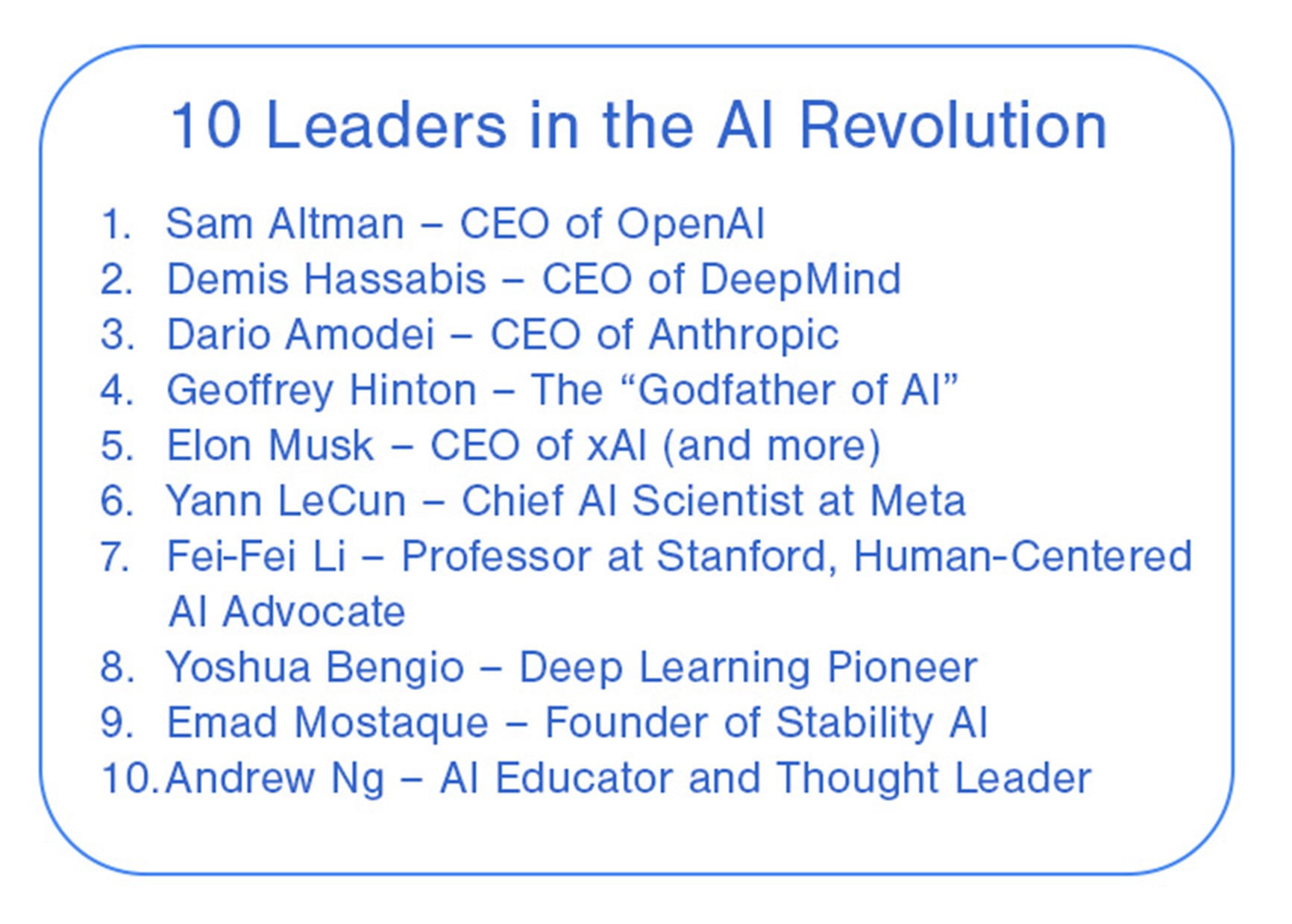The People Behind the Machines: 10 Leaders in the AI Revolution
When we talk about Artificial Intelligence, it’s easy to imagine lines of code, glowing data centres, and faceless algorithms. But behind every leap in AI – from chatbots to protein-folding predictions – there are real people. Some are scientists, some are entrepreneurs, some are cautious visionaries, and a few are bold mavericks.

This blog is an insight into ten individuals who are not just building the future of AI, but shaping how the world will live, work, and learn in the years ahead. We’ve ranked them by their current influence and added a few personal details to remind us that even the most powerful tech is still driven by very human minds. Let’s start with a list of our top 10:
Sam Altman – CEO of OpenAI
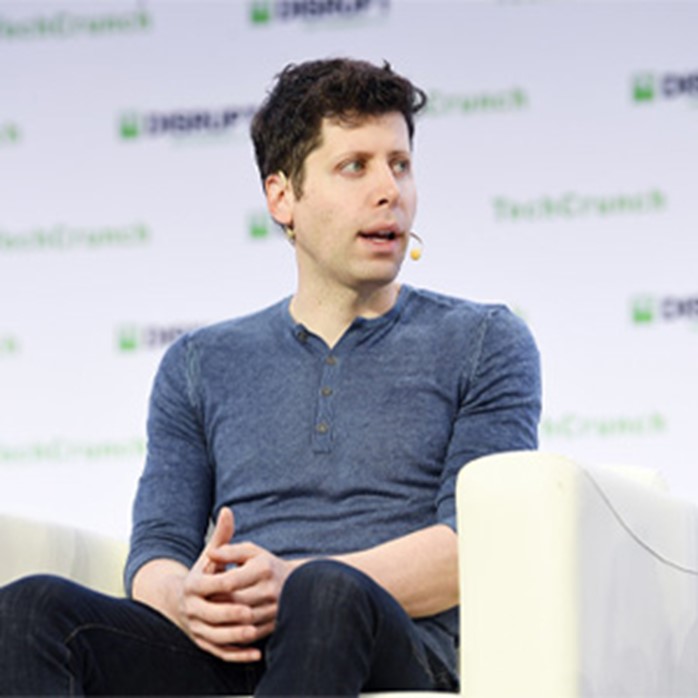
Sam Altman has become the public face of generative AI. Formerly president of Y Combinator, Altman co-founded OpenAI in 2015 and now leads the company behind ChatGPT. Under his leadership, OpenAI went from a niche research lab to a multibillion-dollar enterprise and global tech disruptor.
Altman grew up in St. Louis, Missouri, and learned to code at the age of eight. He was fascinated by computers from a young age – and came out as gay as a teenager, crediting the internet with helping him understand himself. He attended Stanford University but dropped out to co-found a location-sharing startup, which sold for millions and catapulted him into Silicon Valley stardom.
Outside of tech, Altman is a survivalist – he’s openly discussed preparing for worst-case scenarios and even having a stockpile of gold, antibiotics, and guns “somewhere in Big Sur.” A serious thinker with a slightly doomsday edge, he balances optimism about technology with deep concern about its misuse.
Did you know? In 2023, he was briefly ousted from OpenAI in a boardroom drama – only to be reinstated days later after staff and investors revolted.
Demis Hassabis – CEO of DeepMind
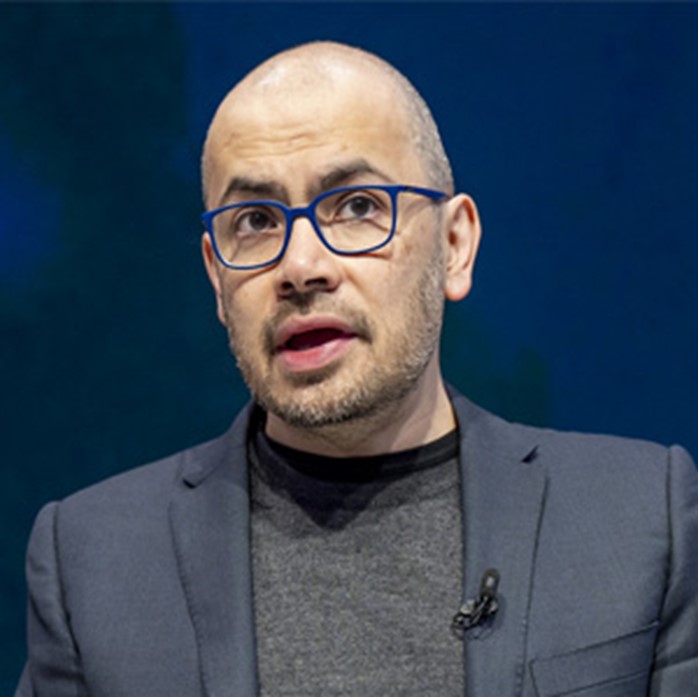
A former child chess prodigy and neuroscientist, Hassabis co-founded DeepMind, which was acquired by Google in 2014. He led the team behind AlphaGo, the first AI to beat a world champion at Go, and AlphaFold, which revolutionized protein structure prediction.
Born in London to a Greek Cypriot father and Chinese-Singaporean mother, Hassabis was playing chess competitively by the age of four and became a master by 13. He started working at Bullfrog Productions when he was just 17, combining his love of gaming and logic. His early success in game design helped fund his later academic studies in neuroscience and cognitive science.
Hassabis is often described as quiet, intense, and deeply thoughtful. He still plays chess, enjoys puzzles, and is fascinated by how the brain works. Friends and colleagues describe him as someone who prefers collaboration over confrontation – an ideal trait when leading cutting-edge teams trying to solve intelligence itself.
Did you know? He designed popular video games in his teens – including the cult classic *Theme Park*.
Dario Amodei – CEO of Anthropic
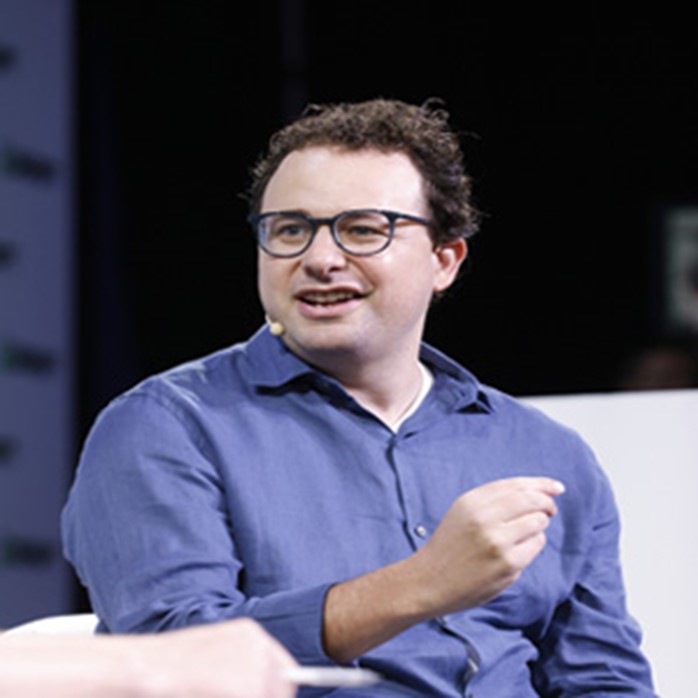
Amodei was a senior researcher at OpenAI before founding Anthropic in 2021. His company focuses on AI alignment – making AI safer and more steerable. Anthropic’s chatbot, Claude, is widely seen as a leading rival to ChatGPT.
Raised in California, Amodei holds a PhD in physics from Princeton but shifted his career focus to AI due to its rapid advancement and immense societal implications. Unlike many tech leaders, he’s famously press-shy and prefers to let his work speak for itself. Even the launch of Claude was done with minimal fanfare, reflecting his cautious and deliberate personality.
He’s especially concerned with the risks of large-scale AI models and has spoken openly about the need for better transparency and guardrails. Colleagues describe him as cerebral, methodical, and unusually principled for someone at the top of a billion-dollar startup.
Did you know? He left OpenAI partly over disagreements about safety and commercial direction – and took several key staff with him.
Geoffrey Hinton – The “Godfather of AI”
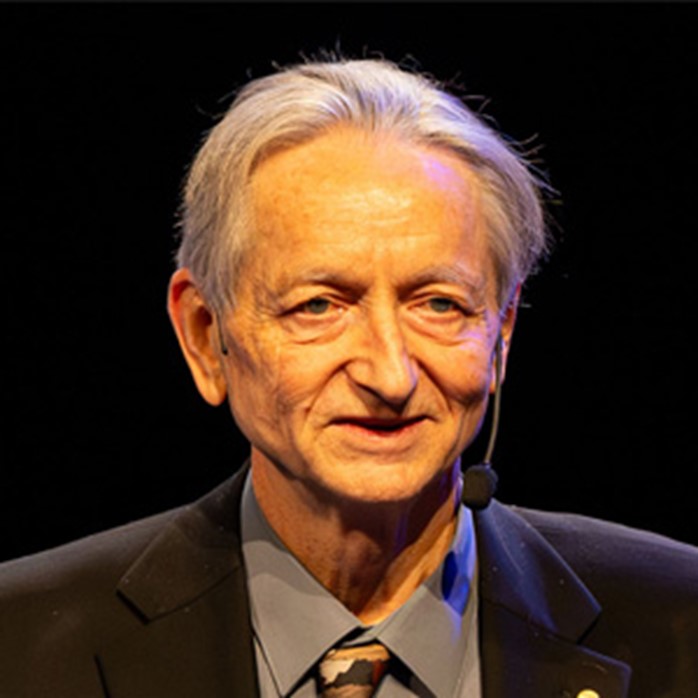
Hinton pioneered neural networks long before they became fashionable. A co-winner of the 2018 Turing Award (often called the Nobel Prize of computing), he helped kickstart the deep learning revolution. In 2023, he left Google to speak freely about AI’s risks.
Born in the UK and now a Canadian citizen, Hinton is the great-great-grandson of George Boole (as in Boolean logic). He’s known for his eccentricities – he prefers walking to driving, dislikes flying, and is fiercely independent. When Google offered him a job, he agreed only if he could stay in Toronto and keep doing academic work.
Outside of AI, Hinton enjoys hiking and philosophy and has an almost monk-like lifestyle. He’s wary of commercial hype and known for his dry humour. In recent years, he’s become one of the most quoted voices warning that AI might someday surpass human intelligence – and not necessarily with good intentions.
Did you know? Hinton once refused a lucrative job at Apple because he didn’t want to move to California – instead, he helped build AI in Toronto.
Elon Musk – CEO of xAI (and more)
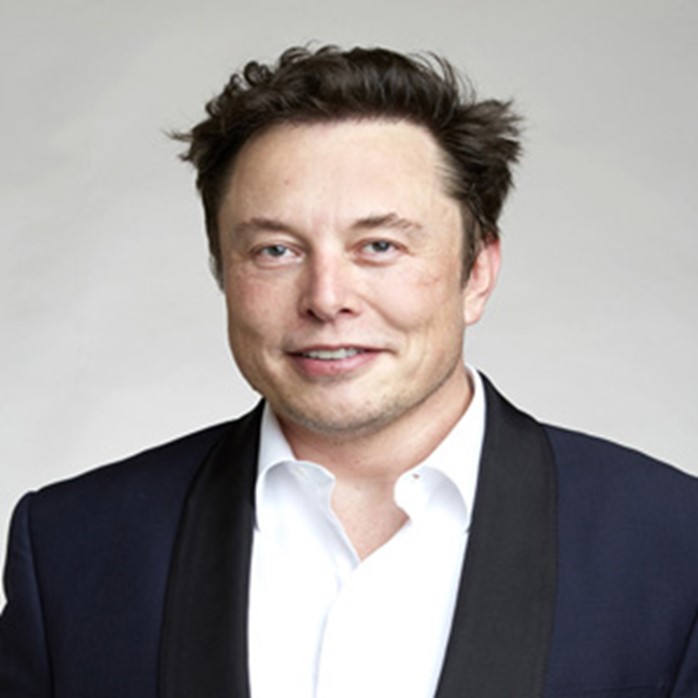
Musk co-founded OpenAI but later stepped away and launched a rival company, xAI. Known more for stirring up controversy than for coding AI himself, Musk’s presence in the AI world looms large due to his wealth, platforms, and high-profile products.
Born in South Africa and now a U.S. citizen, Musk is arguably the world’s most recognisable tech entrepreneur. He’s also the only person on this list whose AI ambitions span electric cars (Tesla), brain interfaces (Neuralink), and space travel (SpaceX). Musk’s fascination with AI is longstanding, and he’s been vocal about the dangers of unchecked development.
In his downtime – if such a thing exists – Musk reportedly enjoys video games, science fiction novels, and long arguments on X (Twitter). He remains a polarising figure: hailed by some as a visionary genius, criticised by others for spreading misinformation and moving fast without caution.
Did you know? His chatbot “Grok,” integrated with X (formerly Twitter), was designed to be “witty” – a jab at what he called overly politically correct AI.
Yann LeCun – Chief AI Scientist at Meta
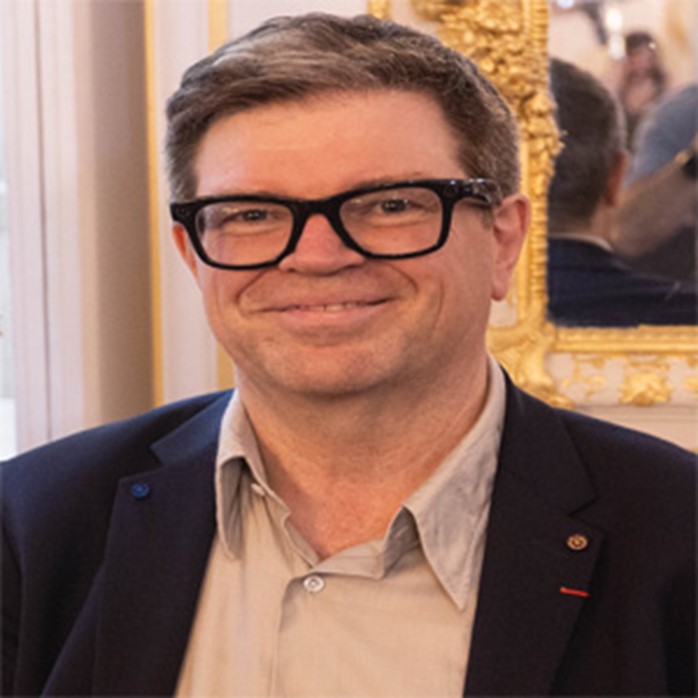
A legend in computer vision, LeCun co-developed convolutional neural networks, a core part of how machines “see” images. As Meta’s Chief AI Scientist, he’s building systems that can learn like humans – without endless data.
LeCun was born in Paris and holds both French and U.S. citizenship. He’s as much a philosopher as a scientist, often engaging in public debates about the nature of intelligence. Unlike many in the field, he’s sceptical of the idea that today’s AI poses existential risk – and he says so, loudly and often.
He’s also an advocate for open science and academic freedom. When he’s not working, LeCun enjoys jazz, photography, and the occasional heated online exchange. He’s known for combining intense technical knowledge with a passion for public discourse.
Did you know? He’s famously combative on X (Twitter), often challenging critics and peers on AI safety and methodology.
Fei-Fei Li – Professor at Stanford, Human-Centered AI Advocate
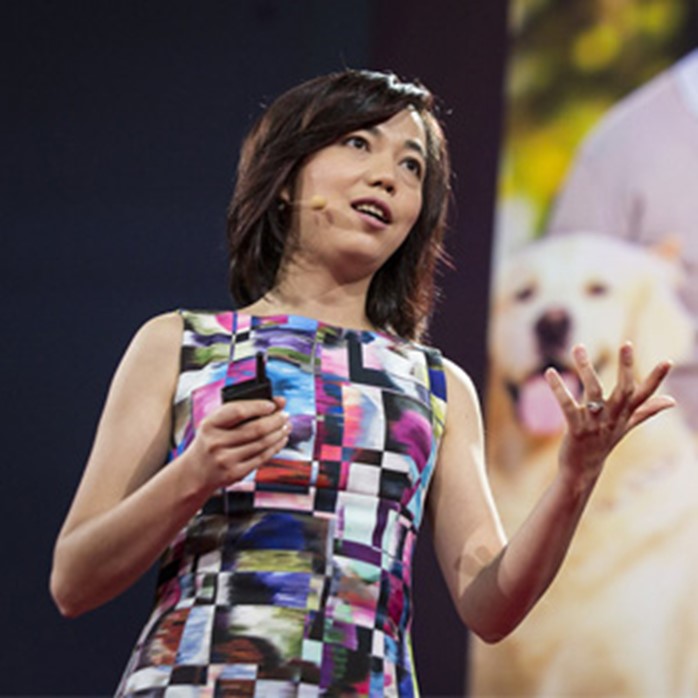
Fei-Fei Li led the creation of ImageNet, the dataset that helped spark the modern AI boom. At Stanford, she co-directs the Institute for Human-Centered AI, promoting ethical and inclusive AI design.
Born in China, Fei-Fei moved to the U.S. at age 16, speaking little English and living with limited means. Her rise through academia is often cited as a classic story of determination and brilliance. Today, she is one of the most prominent women in AI – and an advocate for diversity in tech.
She’s also passionate about the intersection of AI and healthcare, having worked on AI systems for diagnosing diseases. Outside of work, she enjoys photography and nature. Her personal story resonates with many young students, particularly women and immigrants hoping to break into tech.
Did you know? She once served as Chief Scientist of AI at Google Cloud – and has testified in Congress about the social implications of AI.
Yoshua Bengio – Deep Learning Pioneer
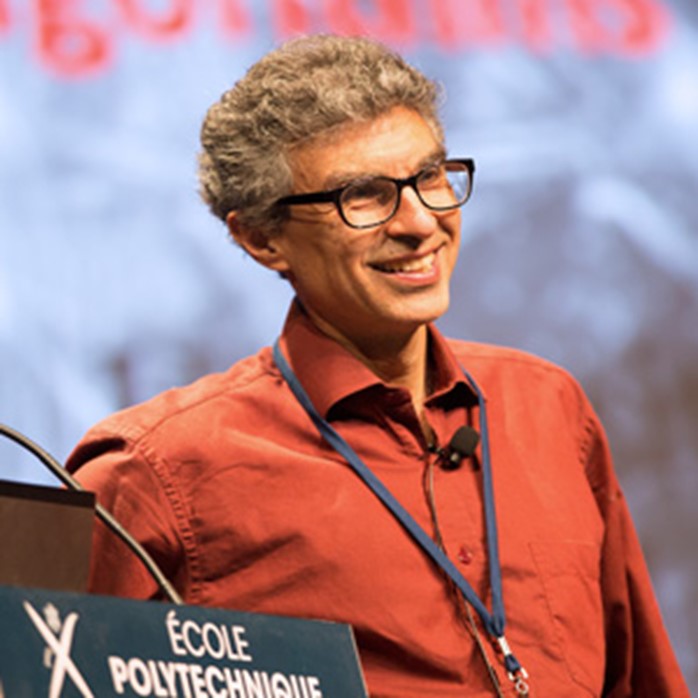
A deep learning luminary and Turing Award winner, Bengio has shifted focus from algorithms to the ethics of AI. Based in Montreal, he advocates for global AI governance and responsible research.
Bengio was born in France but moved to Canada as a child and has spent most of his professional life at the University of Montreal. He’s known for his modest, reflective manner and strong ethical stance on AI’s future. He often speaks about the need to balance innovation with responsibility.
Outside the lab, Bengio enjoys classical music and hiking, and he frequently meditates. In recent years, he’s become almost monk-like in his calm delivery and gentle warnings – earning respect even from those who disagree with his policy views.
Did you know? Bengio has called for an “international agency” to regulate frontier AI models – comparing the need to the IAEA for nuclear safety.
Emad Mostaque – Founder of Stability AI
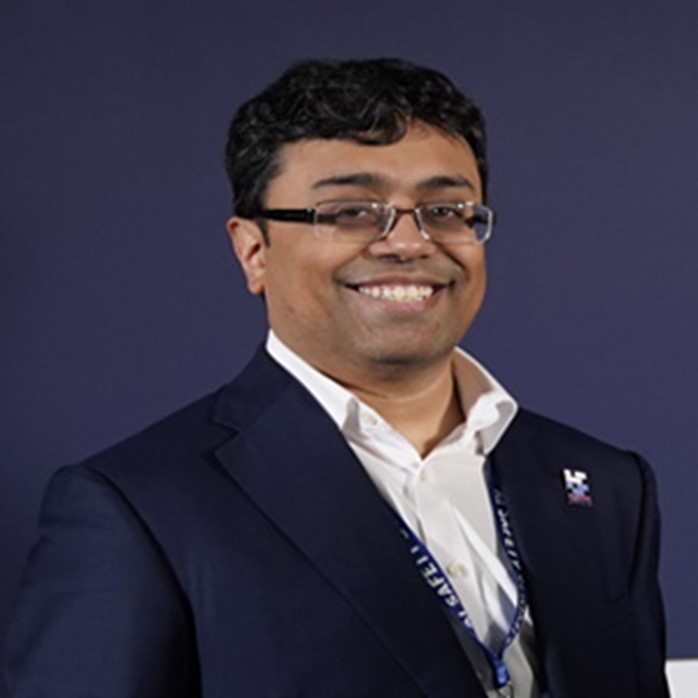
Mostaque champions open-source AI through tools like Stable Diffusion, a text-to-image generator that exploded in popularity. Stability AI aims to democratize AI by keeping its tools free and transparent.
Born in the UK to Bangladeshi parents, Mostaque studied at Oxford and worked in finance before pivoting to AI. He has positioned himself as a rebel in the AI world, often criticising Big Tech for keeping models behind paywalls. His vision is to make AI tools accessible to everyone, not just large corporations.
Outside of AI, Mostaque is interested in philosophy, economics, and public policy. He’s been known to take bold bets – some pay off, others don’t – but he thrives on disruption and has become a cult figure among AI developers who value transparency.
Did you know? He’s known for his bold claims – including that open AI models will soon surpass closed ones. Some admire him; others remain sceptical.
Andrew Ng – AI Educator and Thought Leader
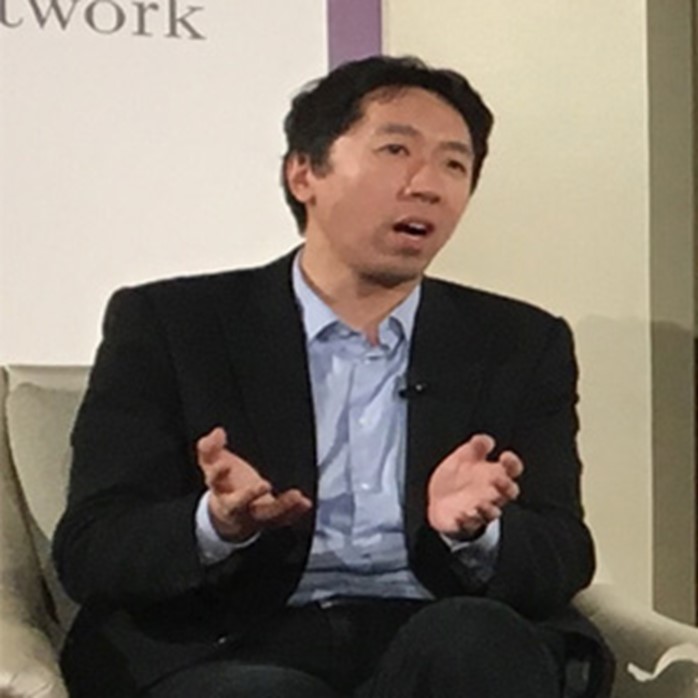
Ng made deep learning practical at scale during his time at Google Brain and Baidu. He’s also responsible for helping millions learn AI through Coursera. Today, he focuses on making AI more accessible and useful in real-world industries.
Born in the UK and raised in Hong Kong and Singapore, Ng later studied at Carnegie Mellon and MIT. He’s famous for his calm, clear teaching style and has helped more people learn AI than perhaps anyone else. His beginner-friendly online courses have enrolled over 5 million students worldwide.
Ng avoids drama and focuses on practical outcomes. He believes AI’s biggest benefits are yet to come – particularly in healthcare, education, and climate modelling. When he’s not teaching or building tools, he enjoys calligraphy, meditation, and classical music.
Did you know? Ng once said that AI is “the new electricity” – a quiet but powerful force transforming every sector of life.
Conclusion
As AI continues to evolve at astonishing speed, it’s worth remembering that these technologies aren’t appearing out of thin air – they’re being created, challenged, and guided by real people with real passions, worries, and quirks. Whether you agree with their visions or not, these ten individuals are shaping the future of AI – and by extension, the future of education, healthcare, communication, and work.
Understanding who they are helps demystify the technology. It reminds us that AI isn’t some distant, robotic force – it’s a tool being shaped by human minds with human motivations. And as we continue to explore how AI fits into our lives, it’s only right that we get to know the people behind the machines.
Written by Colin King, co-founder and owner of Education Quizzes – a UK-based platform offering teacher-written quizzes that have built-in Safe AI Tutoring.

